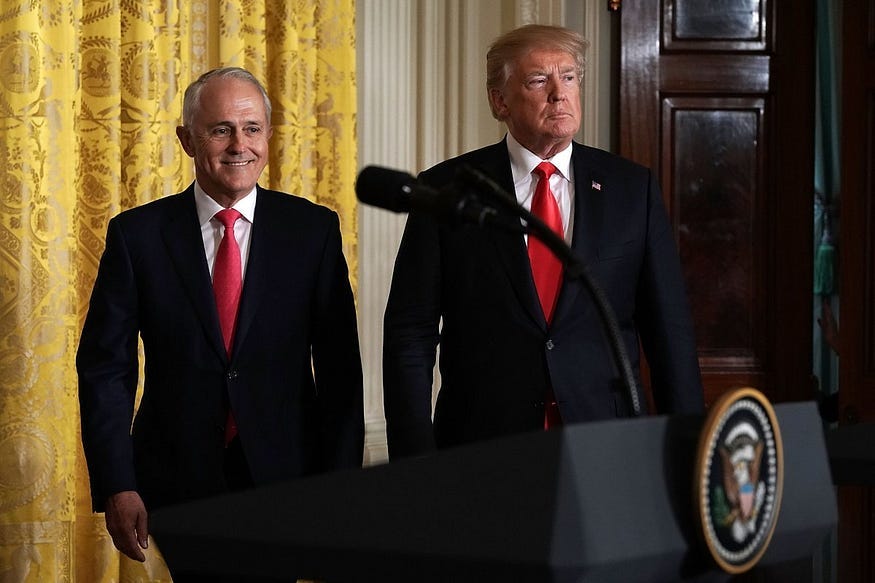Analysis of “Ex-Prime Minister Issues Warning on Trump: ‘Creepy’”
Former Australian Prime Minister Malcolm Turnbull warns of Trump’s admiration for authoritarian leaders, sparking concerns about the future of U.S. alliances and democratic values.

Turnbull highlights Trump’s admiration for leaders like Putin, describing Trump’s behavior around him as “creepy” and akin to “a 12-year-old boy meeting the football team.”
Former Australian Prime Minister Malcolm Turnbull has expressed concern over the potential return of Donald Trump to the White House, warning that Trump’s affinity for authoritarian leaders like Vladimir Putin could destabilize global alliances. Turnbull described Trump’s behavior around Putin as “creepy” and suggested that Trump is “in awe” of the Russian leader. He cautioned that a second Trump term might align the U.S. more closely with autocratic regimes, threatening democratic norms and alliances with countries like Australia and European nations.
Trump’s campaign responded by portraying Trump’s previous presidency as one of “peace through strength,” contrasting it with what they describe as President Biden’s weakness. This debate reflects a broader tension within the Republican Party, influenced by the legacy of political strategist Lee Atwater, whose tactics involved appealing to voter fears and resentments. Trump’s direct style continues this trend but is more explicit in its appeals, raising questions about the GOP’s future direction and the impact on U.S. foreign and domestic policy as the 2024 elections approach.
Key Points:
Context: The article revolves around former Australian Prime Minister Malcolm Turnbull’s concerns about Donald Trump potentially returning to the White House. Turnbull’s comments were made in light of Trump’s stance on global affairs, particularly his perceived affinity for authoritarian leaders like Russian President Vladimir Putin.
Turnbull’s Concerns:
Affiliation with Dictators: Turnbull highlights Trump’s admiration for leaders like Putin, describing Trump’s behavior around him as “creepy” and akin to “a 12-year-old boy meeting the football team.” This metaphor suggests that Trump idolizes strongman figures, raising concerns about how he might interact with such leaders if re-elected.
Impact on Alliances: Turnbull argues that Trump’s approach during his presidency destabilized international alliances, which could be detrimental in the current geopolitical climate, especially given ongoing tensions with Russia and China.
Future of U.S. Leadership: Turnbull questions the future of U.S. leadership under Trump, warning that America could resemble an autocracy rather than a democracy, aligning itself more closely with authoritarian regimes.
Trump Campaign’s Response:
Rebuttal: Trump’s campaign spokesperson, Karoline Leavitt, counters Turnbull’s remarks by framing Trump’s past presidency as one marked by “peace through strength.” She argues that Trump’s actions deterred adversaries like Russia, in contrast to what she describes as Biden’s “ineffective weakness.”
Narrative Reframing: The response also critiques media portrayals of Trump, suggesting that his critics, particularly in the mainstream media, are biased against him.
Contextual Background:
Lee Atwater’s Influence on Republican Strategy: The discussion of Trump’s approach to global politics and his interaction with figures like Putin draws a parallel to the strategies used by Republican political consultant Lee Atwater. Atwater’s approach involved leveraging divisive tactics and appealing to white resentment to mobilize the GOP base. Trump’s confrontational style, especially in foreign policy, reflects a similar strategy of appealing to base sentiments, maintaining a tough stance, and framing opposition as weak.
Trump’s Approach to Putin: Critics have often pointed out Trump’s praise for Putin and other authoritarian figures, suggesting a tendency towards alignment with strongmen, which contrasts with traditional democratic values. This is consistent with Turnbull’s warning about Trump’s apparent admiration for dictators and his potential impact on global democratic alliances.
Current Relevance:
Political Implications for the 2024 Election: Turnbull’s comments come at a time when Trump is poised to become the Republican nominee, raising questions about how his return to power might alter U.S. foreign policy, especially concerning authoritarian regimes. This aligns with broader concerns about the GOP’s shift away from traditional democratic norms, which were evident in Trump’s previous term.
Geopolitical Concerns: As the war in Ukraine continues, Turnbull’s warning reflects fears that a Trump presidency could destabilize the existing international order by favoring autocrats like Putin, thereby affecting global alliances, particularly those involving Australia and Europe.
Correlation with Lee Atwater and Today’s Republican Party:
Rhetorical Strategies: The article draws parallels to the playbook developed by Lee Atwater, who was known for his racially coded language and divisive tactics aimed at appealing to a conservative base. Trump’s approach similarly uses provocative language and “us versus them” rhetoric, which appeals to a specific voter base that feels alienated or disenchanted with current political trends.
Shift from Subtlety to Explicitness: Atwater’s strategy involved subtle, coded language (“dog whistles”) to indirectly appeal to certain voter sentiments, while Trump has often employed more direct and explicit statements (a shift from “dog whistle to bullhorn”). Trump’s comments about Putin and his critical stance on Biden reflect this evolution in strategy, amplifying divisive themes in a more direct manner.
Broader Implications:
Potential Risks to Democracy: Turnbull’s warning about Trump’s return to power speaks to broader fears about democratic backsliding. His description of Trump’s America potentially aligning with autocracies echoes concerns that Trump’s presidency could further erode democratic norms, both domestically and internationally.
Strategic International Positioning: Turnbull’s remarks highlight the importance of how U.S. leadership is perceived globally. If Trump’s administration continues to undermine traditional alliances and foster relationships with authoritarian regimes, it could alter the global balance of power in ways that might challenge democratic principles and international stability.
Conclusion:
Malcolm Turnbull’s warning about Trump reflects deep-seated concerns regarding the former president’s affinity for authoritarian figures like Putin and the potential consequences of a second Trump term on international democracy. This warning aligns with fears of a broader shift within the Republican Party toward a more divisive, confrontational approach, similar to strategies initially laid out by figures like Lee Atwater. As the 2024 elections approach, these issues will likely remain central to debates about the future direction of U.S. domestic and foreign policy.


